Washington Outlet Claims Iran Nuclear Talks Over
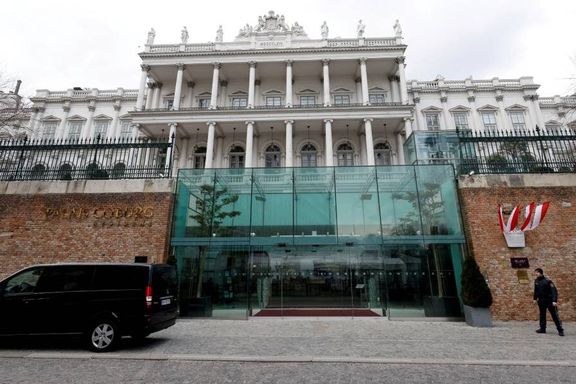
United States negotiations over reviving the 2015 Iran nuclear deal are at an end, the pro-conservative Washington Free Beacon reported Wednesday.

United States negotiations over reviving the 2015 Iran nuclear deal are at an end, the pro-conservative Washington Free Beacon reported Wednesday.
The Beacon said this was concluded by senior US officials in a classified briefing two weeks ago to members of the House of Representatives Foreign Affairs Committee. The outlet cited Darrell Issa, a Republican house member, and “other congressional sources familiar with the briefing.”
Issa, a supporter of former president Donald Trump, said they “are stymied over how they get to a deal because they’ve negotiated all there was to negotiate.” Issa said Iran was “basically on the eve of getting a nuclear weapon and don’t want to be talked out of it.”
Since the confidential House briefing September 14, US officials have publicly stressed their support for continuing efforts to revive the 2015 agreement, the JCPOA (Joint Comprehensive Plan of Action), which limited Iran’s nuclear program and eased international sanctions.
A State Department official told journalists September 22 that talks had “hit a wall.” Ned Price, State Department spokesman, defended the JCPOA Monday by arguing US withdrawal had increased Iran’s “actions against our partners, the potential targeting even of American facilities and personnel…[making Iran] more aggressive, and … deadlier.”
Iran Foreign Minister Hossein Amir-Abdollahian restated Wednesday that Iran wanted US ‘guarantees’ of economic cushions should the US leave a revived JCPOA, as it did during Trump’s presidency in 2018 when imposing ‘maximum pressure’ sanctions.
Several US senators told Iran International that Washington should stop talks with the Islamic Republic over revival of the 2015 nuclear deal, especially considering the ongoing popular protests.
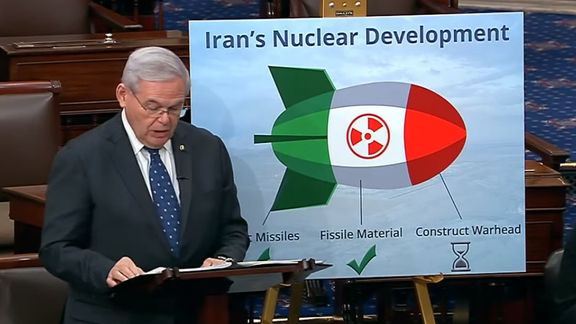
Several US senators told Iran International that Washington should stop talks with the Islamic Republic over revival of the 2015 nuclear deal, especially considering the ongoing popular protests.
Democratic Senator from New Jersey Bob Menendez, who is the chairman Senate Foreign Relations Committee, told our correspondent that the United States should get ready for the fall of the regime in Iran, noting that the last time Iranians revolted against the government, the US did not have any plans.
“I hope we'd be ready, and we'd have our contingencies and engagement, because we lost in the Green Revolution, we should be able to be ready for it now,” he said.
Utah’s Republican Senator Mitt Romney also voiced his support for the popular uprising of the Iranians -- triggered by the death of 22-year-old woman Mahsa Amini in the hands of hijab police – saying that currently it is not a good idea to be negotiating with Iran on a nuclear deal. “Iran is a bad actor and providing more resources to them and relieving sanctions would be a big mistake.”
Echoing similar sentiments, Alabama’s Republican Senator Tommy Tuberville warned against further nuclear negotiations with Iran while the country is in turmoil. “We don't need to get back to that dialog with Iran. They're obviously having problems over there right now. They need to work out their own problems.”
Calling the Islamic Republic’s authorities “dictators,” he said he is not surprised that “the Iranian regime is clamping down on Iranian protesters.”
Republican Senator from North Carolina Thom Tillis described the Biden administration's plan to go back to negotiating table with Iran as “ill-advised,” underlining that the Islamic Republic is a “state sponsor of terror” that every year “invests hundreds of millions of dollars” to destabilize the Middle East.
He added that it is beyond his comprehension that the Biden administration “thinks it'd be wise to do anything that would bolster that leadership versus stand with the Iranian people who want change.”
Pennsylvania's Senator Pat Toomey, also a Republican, called on the Biden administration to voice very strong, clear support for the protesters, highlighting that they are “only protesting for basic human rights, and they deserve those rights.”
He told our Congressional reporter Arash Alaei that “I don't think we can get a workable nuclear deal with this regime.”
Toomey said he does not have the expertise to make a prediction about the collapse of the regime, adding that “Sadly we know authoritarian regimes are able to retain power for a long period of time even when they're not popular.”
Republican Senator Mike Rounds from South Dakota also urged the administration against negotiating with Iran right now, emphasizing that the Islamic Republic is “a terrorist state.”
He touched upon the suffering of Iranians under the regime, saying, “Once again they're using some of those same tactics against their own people.”
Stressing that the “terrorist” regime in power in Iran is different from the Iranians who are good people themselves, he said that “we're having a difficult time in trying to find common ground with them (the regime). And that hurts our ability to have a good relationship with the people of Iran.”
Chris Van Hollen, Maryland's Democratic senator, also denounced the Islamic Republic's “vicious crackdown” on protesters as a “gross violation of women's rights and human rights,” expressing satisfaction that Washington slapped sanctions on hijab police and some security officials involved in the crackdown on peaceful protesters.
The Treasury Department said last week that its Office of Foreign Assets Control (OFAC) isdesignating Iran’s Morality Police “for abuse and violence against Iranian women and the violation of the rights of peaceful Iranian protestors.”
However, he said repression is already brutal in Iran without a nuclear deal, “So the idea that entering an agreement would cause the Iranian regime to be more brutal in its crackdown doesn't make sense to me.” “A nuclear armed Iran is worse for the US and our allies than a non-nuclear Iran,” he said, implying support for revival of the Joint Comprehensive Plan of Action (JCPOA).
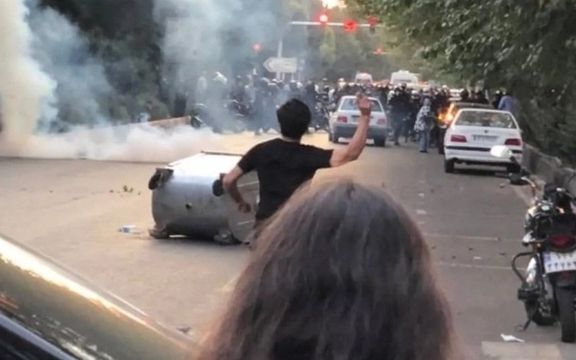
Iran's state television has opened its doors to some reformists who are allowed to make hygienic comments about the uprising by the country's youth and women.
But the tightly controlled broadcaster always juxtaposes the reformists with staunch hard-liners who offer counterarguments to the reformists' shy statements about why the system needs to open up to survive.
Even some of the reformists who have taken part in the debates on the Iranian state TV, have said in interviews with relatively independent media outlets in Iran that the state TV's openness is questionable.
Sadeq Zibacalam a usual suspect on Iranian media and foreign-based televisions to comment on almost everything during the past 30 years, has said in an interview with Didban Iran website that "state TV officials' behavior is authoritarian. Like all authoritarian regimes, the state TV also never acknowledges that there might be flaws and weaknesses in the system."
He added that "the grudge and hatred that has been accumulated in the Iranian society over the years is [partly] due to ignoring these weaknesses." He added that the state TV which operates under Supreme Leader Ali Khamenei "has never had a realistic approach to ongoing developments during the past 43 years."
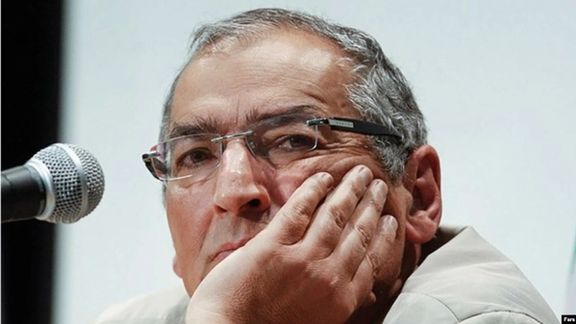
Accordiong to Didban Iran, many observers have been recently criticizing the state TV “which is no longer the point of reference for news and information for the people of Iran." In fact, government media has long ceased to be credible and instead people rely on Persian-speaking broadcasters, such as Iran International and Manoto TV for news and views.
"Just like the government, the state TV attributes the protests to US conspiracies and the actions of Zionists, monarchists and rioters," said Zibakalam, adding that the state TV is part of the Iranian government. It is no surprise as the chairman of the television, Payman Jebelli has reiterated time and again that it is the government's not the people's media. He further added that the state TV does not have any plan to help the regime get out of the current crisis.
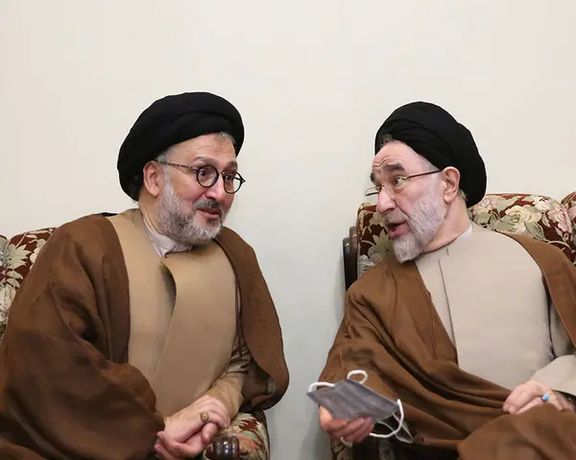
Meanwhile, Mohammad Ali Abtahi, a cleric who was former President Mohammad Khatami's chief of staff in late 1990s and early 2000s, said in an interview with Didban Iran that "the state TV's new approach of openness is temporary." He added that some ruling hard-liners say that putting one step back from their uncompromising positions might lead to a domino-like collapse of the system.
Abtahai, who was the head of the Iranian radio in the late 1980s and early 1990s, said, "I believe the open debates that are currently taking place on the state TV might not continue."
Some in the Iranian government believe that hard-liners should not put even one step back from their positions as a result of the protests that followed Mahsa Amini's death in custody, Abtahi argued. This school of thought does not tolerate dialogue, he added. "The other school of thought is reformism. Those who believe in this maintain thatwrong approaches could be corrected in a step-by-step approach," he said. However, he added that social pressure can force hard-liner officials to make compromises about some of their "principles".
However, critics of reformists say that more than two decades of a step-by-step approach has made matters worse and hard-liners more dominant in the government.
Two days after comedian Mehran Modiri belatedly expressed support for the protests, the state TV announced that it has cancelled his talk show, in a sign of intolerance.
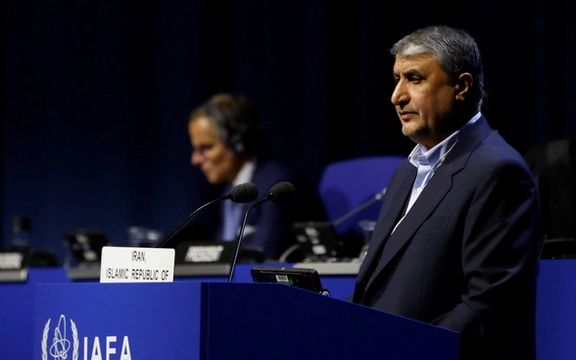
Rafael Mariano Grossi, head of the United Nations nuclear agency, will continue talks with Iran over the agency probe into uranium traces in undeclared sites.
Grossi is due to sit down later this week with Mohammad Eslami, head of the Atomic Energy Organization of Iran, after the two met Monday on the side-lines of the annual conference of the UN’s International Atomic Energy Agency (IAEA) in Vienna. Alongside a picture of the two shaking hands, Grossi tweeted that “dialogue has restarted with Iran on clarification of outstanding safeguards issues.”
Monitoring ‘safeguards’ commitments of state signatories of the Nuclear Proliferation Treaty is a central IAEA function but in Iran’s case has become entangled in negotiations to revive the 2015 Iran nuclear agreement, the JCPOA (Joint Comprehensive Plan of Action).
Whereas Tehran has argued the IAEA ‘safeguards’ probe into the uranium traces, relating to work before 2003, should be dropped as part of JCPOA revival, the United States and three European JCPOA signatories have said it must continue until Iran’s answers satisfy the agency.
Grossi told the IAEA annual conference that the investigation was “not going to go away.” Eslami told the conference the probe was based on “false, baseless information,” referring to its origins in allegations made by Israel in 2018 at the time President Donald Trump pulled the US out of the JCPOA and imposed ‘maximum pressure’ sanctions on Iran.
‘Baseless allegations’
Iran’s foreign minister Hossein Amir-Abdollahian told al-Monitor Sunday that Tehran was “ready to provide answers” over the uranium traces, found at three sites undeclared as nuclear-related, as long as the agency behaved “technically” rather than politically.”
Abdollahian reiterated that Iran expected the agency to drop “baseless allegations” before the JCPOA could be restored, and called for “political will to close the case.” He repeated Iran’s claim of a precedent from 2015, when the IAEA produced a ‘final’ report into possible military dimensions of Iran’s nuclear program before 2003.
The foreign minister also pointed out that with the JCPOA restored, the agency would have access to the Iranian nuclear program “beyond safeguards.” Under the 2015 agreement Iran to implemented the ‘Additional Protocol,’ which added to the IAEA’s monitoring powers and obliged Tehran to accept the IAEA access needed to vouchsafe JCPOA implementation.
Grossi, who referred Monday to the “need to find a common solution,” may accept that the greater agency powers under a restored JCPOA could help the agency investigate the uranium traces. He told NPR in an interview in late August: “If the IAEA is allowed to do our inspection work, we are going to get there – I’m pretty confident.”
On another challenge facing JCPOA talks, Amir Abdollahian told al-Monitor that “some progress” had been made in recent weeks in messages exchanged with the US over Tehran’s demand for ‘guarantees’ it would be cushioned economically should Washington subsequently withdraw from a restored JCPOA.
On regional tensions, Amir-Abdollahian said he last week had discussions with Iraqi foreign minister Fuad Hussein over next steps in Baghdad-mediated contacts designed to return to “normal” Iran-Saudi Arabia relations with reopening of embassies. Formal ties were broken off in 2016 after protestors in Tehran attacked the Saudi embassy following the Saudi execution of Shia cleric and opposition figure Nimr al-Nimr.

The Iranian-American Medical Association has sacked its president because he held a meeting with Iranian President Ebrahim Raisi during his visit to New York City.
The association issued a statement on Sunday saying that the Iranian-American community will no longer be silent in the face of appeasement of and association with “this evil regime.”
The Board of Directors and Board of Trustee's of the Iranian-American Medical Association (IAMA) said in its statement that Dr. Shervin Mortazavi’s meeting with Raisi – which was revealed following a photo of the meeting – was not scheduled by the association, adding that the IAMA was completely unaware of such action.
“Dr. Mortazavi has publicly stated this was a private engagement that had nothing to do with his role at IAMA,” the statement read.
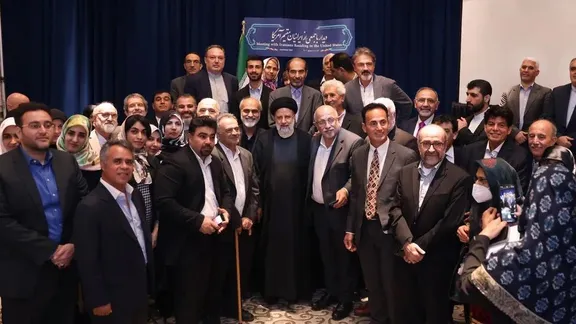
Strongly condemning the meeting, IAMA said that “Regardless of the reason, this was not acceptable by the Board members, hence accordingly and unanimously the Board asked him (Mortazavi) to resign immediately.”
It added that the IAMA has also asked him “to distance himself completely from our organization, which during its 30 years history has solely been a scientific, humanitarian, non-political, non-religious, and non-profit organization.”
“We, as IAMA members, like other Iranians all over the world, strongly condemn what has happened to Masa Amini, a young innocent girl as a distinct violation of human rights,” it said, referring to the death of the 22-year-old Kurdish girl whose death in custody of hijab police has triggered nationwide unrest in Iran.

Calls for tougher sanctions on Iran over the September 16 death in custody in Tehran of Mahsa Amini go nowhere near far enough for some.
The European Union is considering new measures against Tehran, while the German foreign ministry summoned the Iranian ambassador Monday. According to Berlin-based Wall Street Journal reporter Laurence Norman has already agreed anti-Iran measures. The United States September 22 announced sanctions against Iran’s morality policy while National Security Adviser Jake Sullivan told NBC Sunday the US was on the “side” of “fundamental justice, dignity and rights.”
Sullivan said the administration’s approach differed from that of President Barak Obama, which he said had been slow to express support for 2009 demonstrations in Iran for fear of protestors being seen as US proxies.
Some commentators are not satisfied. “Control of women’s bodies isn’t a by-product of Islamic rule but its foundation,” wrote Janice Turner in the London Times Saturday. “If hijab falls, so does the regime…By enforcing hijab, the government inveigles itself into your bedroom.”
‘Righteous anger’
Turner argued the veil was “neither a Persian tradition nor a practice that, as in Indonesia or Pakistan, grew with the ascendancy of conservative Islam.” Rather it arrived in Iran enforced after the 1979 Islamic Revolution.
In earlier columns, Turner has argued that veiled women in Europe provoked among Muslims “a righteous anger whose logical conclusion is jihad,” and that allowing hijab in colleges and public buildings in Turkey brought the end of “Ataturk’s secular state.”
In the Sunday Times, Nazanin Zaghari-Ratcliffe wrote that Amini’s death had been marked by a gathering in Evin prison, where Zaghari-Ratcliffe, an employee of Thomson Reuters, was held for part of her four years in jail before she left Iran in March after the United Kingdom honored a £400-million debt ($428 million).
“Forty of the inmates then gathered in the communal yard, in solidarity with Mahsa’s family but also with all the women in Iran battling for their rights,” Zaghari-Ratcliffe wrote. “They lit candles, sang songs, chanted together and mourned the death of yet another innocent woman.”
Media ‘legitimizing gender discrimination’
In the Wall Street Journal, Karim Sadjadpour, Washington-based senior fellow at the Carnegie Endowment for International Peace, argued that the “lone source of diversity” in Iran’s “rotting regime” was whether the beards and turbans of its ruling men are black or white.”
Criticizing CBS interviewer Lesley Stahl for wearing a headscarf when interviewing President Ebrahim Raisi in Tehran September 13, Sadjadpour accused news organizations, governments and NGOs of “legitimizing…gender discrimination.”
The Biden administration, Sadjadpour agued, should “reassess its Iran strategy” including “shortsighted” efforts to revive the 2015 Iran nuclear deal, the JCPOA (Joint Comprehensive Plan of Action), which limited Iran’s nuclear program in return for eased international sanctions. A “representative” government in Tehran “could be a political geopolitical game changer for the United States” and was “the single most important key to transforming the Middle East,” Sadjadpour claimed.
But the Carnegie senior fellow stopped short of advocating the end of any talks with Iran. He suggested US should aim both to negotiate with Iran’s leaders and undermine them, as it had done with Soviet Union.
No deals with ‘savages’
By contrast, Masih Alinejad, New York-based social-media influencer and Voice of America contributor, said Sunday no talks should take place with “these savages.” Addressing the advocacy group United Against A Nuclear Iran, Alinejad said history would “judge” President Joe Biden for “saving” Iran’s rulers. “Instead of getting a deal, stand up for your values,” she said.
Alinejad told Fox News during Iranian president Ebrahim Raisi’s recent trip to the UN in New York that “Iranians” wanted to see Raisi meet the same fate as Qasem Soleimani, the general killed with ten others by a US drone strike in Baghdad in 2020 in what the UN deemed ‘unlawful killing.’ Alinejad told Fox presenter Martha McCallum that Raisi “was the terrorist…And he came here with the member of Revolutionary Guards.”